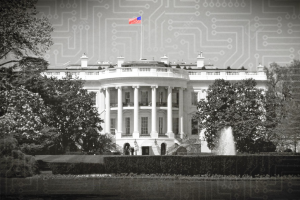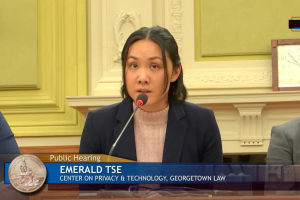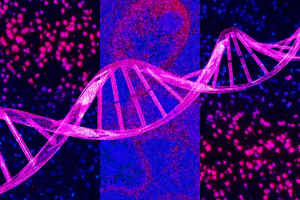Our Work
Founded in 2014, the Center on Privacy & Technology is a leader at the intersection of privacy, surveillance, and civil rights.
Latest Work

“Raiding the Genome” cited in Electronic Frontier Foundation memo
The Privacy Center's 2024 report "Raiding the Genome" was cited in this Electronic Frontier Foundation memo to the Trump administration. "A recent report from the Center on Privacy & Technology at Georgetown Law identifies many of the privacy concerns inherent in the program, including its violation of the Fourth Amendment," writes the report.

“Biden Is About to Hand Over a Vast and Unconstitutional DNA Database to Trump” Op-Ed in Truthout
Executive Director Emily Tucker published an op-ed, “Biden Is About to Hand Over a Vast and Unconstitutional DNA Database to Trump” in Truthout about the immense DNA database the Department of Homeland Security has been creating and the danger it holds especially as Donald Trump returns to office. "Every person's privacy, security and civil rights are implicated by this program," wrote Tucker.

Privacy Center quoted in EdSurge piece about facial recognition in schools
Senior Associate Clarence Okoh spoke with Nadia Tamez-Robledo at EdSurge for an article about facial recognition in schools. "Any conversation about safety that begins with surveillance or policing is beginning in the wrong place," Okoh stated.

“Testifying in Support of the DC Consumer Health Information Privacy Protection Act” blog
On October 17, 2024, Associate Emerald Tse testified in a hearing before the D.C. Council Committee on Health in support of the Consumer Health Information Privacy Protection Act (CHIPPA). Modeled after Washington State’s My Health My Data Act, CHIPPA would provide privacy protections for consumer health data. Her full written testimony is on our blog.

Op-Ed in The Pittsburgh Post-Gazette
Justice Fellow Emerald Tse wrote an op-ed highlighting a bill moving through the Pennsylvania legislature (SB 988) that would expand DNA collection by law enforcement, and its implications for state residents as well as people across the country. Drawing on the Privacy's Center's findings in "Raiding the Genome," she argues, "This proposal is part of a national push to increase government access to the DNA of as many people as possible." Following publication of this op-ed, the bill failed to move out of the PA's Senate Judiciary Committee and ultimately died by the end of legislative session.

“Raiding the Genome” report covered in The Latin Times
The Latin Times covered the findings and release of our latest report "Raiding the Genome: How the United States Government Is Abusing Its Immigration Powers to Amass DNA for Future Policing." The article quoted directly from the report.

“Raiding the Genome” report in Newsweek
Newsweek covered our latest report findings from "Raiding the Genome: How the United States Government Is Abusing Its Immigration Powers to Amass DNA for Future Policing." The article featured an interview with Emerald Tse: "In addition to the massive increase [since 2020], the fact that it's happening through coercive tactics; that the program is illegal and disproportionate; and has a disproportionate impact on people of color [makes it wrong]," Tse said.

Telemundo Covers “Raiding the Genome”
Telemundo covered our latest report findings from "Raiding the Genome: How the United States Government Is Abusing Its Immigration Powers to Amass DNA for Future Policing" in a video piece and featured an interview (in Spanish) with report co-author and Director of Research & Advocacy Stevie Glaberson.

“Raiding the Genome” report covered in The Record
The Record covered our latest report findings from "Raiding the Genome: How the United States Government Is Abusing Its Immigration Powers to Amass DNA for Future Policing." The article featured an interview with Associate Emerald Tse: “Many of the people that we interviewed did not see written notices and they were not verbally told that their DNA was taken either,” Tse said.

LA Times Covers “Raiding the Genome”
The LA Times covered our latest report findings from "Raiding the Genome: How the United States Government Is Abusing Its Immigration Powers to Amass DNA for Future Policing." In a front page article. Director of Research & Advocacy Stevie Glaberson was quoted "Even when people know what’s happening, they’re terrified to ask questions, they’re terrified to object, they’re terrified to refuse."
